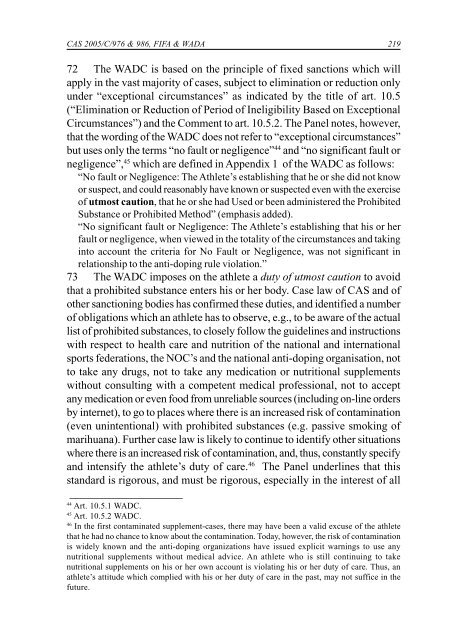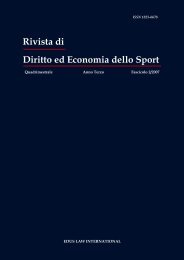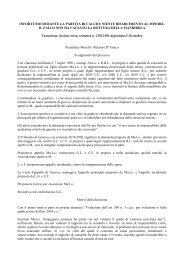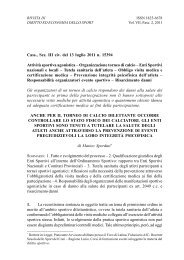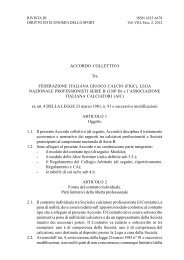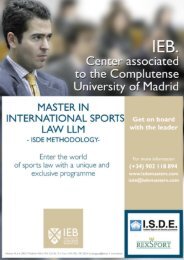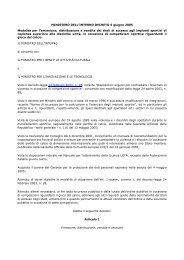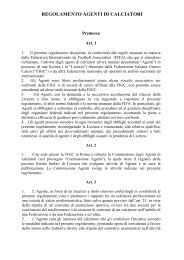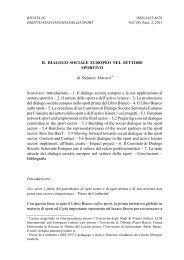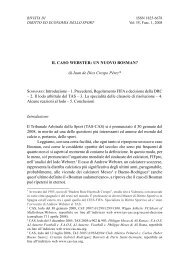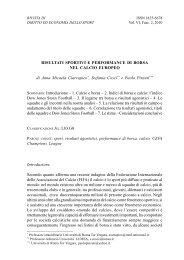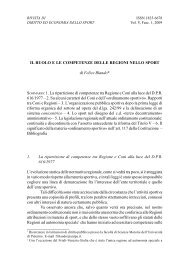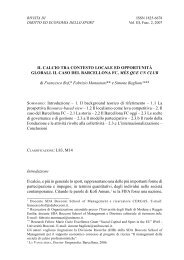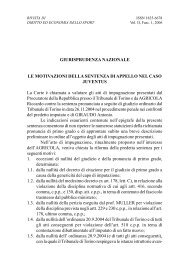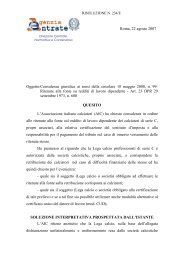Rivista di Diritto ed Economia dello Sport - Rdes.it
Rivista di Diritto ed Economia dello Sport - Rdes.it
Rivista di Diritto ed Economia dello Sport - Rdes.it
You also want an ePaper? Increase the reach of your titles
YUMPU automatically turns print PDFs into web optimized ePapers that Google loves.
CAS 2005/C/976 & 986, FIFA & WADA 21972 The WADC is bas<strong>ed</strong> on the principle of fix<strong>ed</strong> sanctions which willapply in the vast major<strong>it</strong>y of cases, subject to elimination or r<strong>ed</strong>uction onlyunder “exceptional circumstances” as in<strong>di</strong>cat<strong>ed</strong> by the t<strong>it</strong>le of art. 10.5(“Elimination or R<strong>ed</strong>uction of Period of Ineligibil<strong>it</strong>y Bas<strong>ed</strong> on ExceptionalCircumstances”) and the Comment to art. 10.5.2. The Panel notes, however,that the wor<strong>di</strong>ng of the WADC does not refer to “exceptional circumstances”but uses only the terms “no fault or negligence” 44 and “no significant fault ornegligence”, 45 which are defin<strong>ed</strong> in Appen<strong>di</strong>x 1 of the WADC as follows:“No fault or Negligence: The Athlete’s establishing that he or she <strong>di</strong>d not knowor suspect, and could reasonably have known or suspect<strong>ed</strong> even w<strong>it</strong>h the exerciseof utmost caution, that he or she had Us<strong>ed</strong> or been administer<strong>ed</strong> the Prohib<strong>it</strong><strong>ed</strong>Substance or Prohib<strong>it</strong><strong>ed</strong> Method” (emphasis add<strong>ed</strong>).“No significant fault or Negligence: The Athlete’s establishing that his or herfault or negligence, when view<strong>ed</strong> in the total<strong>it</strong>y of the circumstances and takinginto account the cr<strong>it</strong>eria for No Fault or Negligence, was not significant inrelationship to the anti-doping rule violation.”73 The WADC imposes on the athlete a duty of utmost caution to avoidthat a prohib<strong>it</strong><strong>ed</strong> substance enters his or her body. Case law of CAS and ofother sanctioning bo<strong>di</strong>es has confirm<strong>ed</strong> these duties, and identifi<strong>ed</strong> a numberof obligations which an athlete has to observe, e.g., to be aware of the actuallist of prohib<strong>it</strong><strong>ed</strong> substances, to closely follow the guidelines and instructionsw<strong>it</strong>h respect to health care and nutr<strong>it</strong>ion of the national and internationalsports f<strong>ed</strong>erations, the NOC’s and the national anti-doping organisation, notto take any drugs, not to take any me<strong>di</strong>cation or nutr<strong>it</strong>ional supplementsw<strong>it</strong>hout consulting w<strong>it</strong>h a competent me<strong>di</strong>cal professional, not to acceptany me<strong>di</strong>cation or even food from unreliable sources (inclu<strong>di</strong>ng on-line ordersby internet), to go to places where there is an increas<strong>ed</strong> risk of contamination(even unintentional) w<strong>it</strong>h prohib<strong>it</strong><strong>ed</strong> substances (e.g. passive smoking ofmarihuana). Further case law is likely to continue to identify other s<strong>it</strong>uationswhere there is an increas<strong>ed</strong> risk of contamination, and, thus, constantly specifyand intensify the athlete’s duty of care. 46 The Panel underlines that thisstandard is rigorous, and must be rigorous, especially in the interest of all____________________44Art. 10.5.1 WADC.45Art. 10.5.2 WADC.46In the first contaminat<strong>ed</strong> supplement-cases, there may have been a valid excuse of the athletethat he had no chance to know about the contamination. Today, however, the risk of contaminationis widely known and the anti-doping organizations have issu<strong>ed</strong> explic<strong>it</strong> warnings to use anynutr<strong>it</strong>ional supplements w<strong>it</strong>hout me<strong>di</strong>cal advice. An athlete who is still continuing to takenutr<strong>it</strong>ional supplements on his or her own account is violating his or her duty of care. Thus, anathlete’s att<strong>it</strong>ude which compli<strong>ed</strong> w<strong>it</strong>h his or her duty of care in the past, may not suffice in thefuture.


